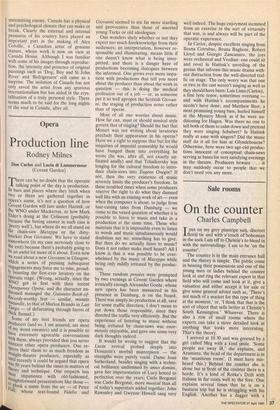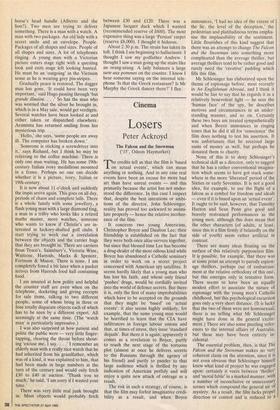Sale rooms
On the counter
Charles Campbell
Iput on my grey pinstripe suit, discreet lfloral tie and with a touch of bohemian in the sock I am off to Christie's to blend in with the surroundings. I am to be 'on the counter'.
The counter is in the main entrance hall and the theory is simple. The public come in bearing their possessions and one of the young men or ladies behind the counter look at and ring the relevant expert in that field who will come and look at it, give a valuation and either accept it for sale or give some general advice such as, 'There's not much of a market for this type of thing at the moment,' or, 'I think that that is the sort of object that sells better at Christie's South Kensington.' Whatever. There is also a row of small rooms where the experts can take a more detailed look at anything that looks more interesting. That's the theory.
I arrived at 10.30 and was greeted by a girl called Meg with a kind smile. 'Some people are away ill,' she explains, and Araminta, the head of the department is in the 'munitions room'. (I must have mis- heard this.) Behind the counter she is alone but in front of the counter there is a horde. It's a kind of Rorke's Drift with Italians in fur coats well to the fore. One explains several times that he is on a business trip but he is struggling with his English. Another has a dagger with a horse's head handle (Alberto and the lion?). Two men are trying to deliver something. There is a man with a watch. A man with two packages. An old lady with a secret smile and an envelope. People. Packages of all shapes and sizes. People of all shapes and sizes. A lot of telephones ringing. A young man with a Victorian picture enters stage right with a questing look and exits stage left looking hunted. He must be an 'outgoing' in the Vietnam sense as he is wearing grey pin-stripes.
Gradually peace is restored. The dagger man has gone, `It could have been very important,' said Hugo passing through `but
grande illusion. . . .' So has the man who was worried that the silver he brought in,' which is in a May sale, would get verdigris. Several watches have been looked at and either taken or dispatched elsewhere., Araminta has returned smiling from her mysterious trip.
`Hello,' she says, `some people are away ill. The computer has broken down.'
`Someone is sticking a screwdriver into it,' says Richard, but I think he may be referring to the coffee machine. There is only one man waiting. He has some 19th- century Italian ivory medallions mounted in a frame. Perhaps no one can decide whether it is a picture, ivory, Italian or 19th-century.
It is now about 11 o'clock and suddenly the impis arrive again. This goes on all day, periods of chaos and complete lulls. There is a whole family with some jewellery, a flash young man with a large diamond ring,
a man in a trilby who looks like a retired
maths master, more watches, someone who wants to know if Christie's are in- terested in hickory-shafted golf clubs. I start trying to work out a correlation between the objects and the carrier bags that they are brought in. There are carriers from Tesco's, Sainsbury's, Victoria Wine, Waitrose, Harrods, Marks & Spencer, Fortnum & Mason. There is none. I am completely foxed a bit later when a packet arrives from Harrods food hall containing food.
I am amazed at how polite and helpful the counter staff are even when on the telephone, docketing and giving receipts for sale items, talking to two different people, some of whom bring in three or four totally disparate objects each of which has to be seen by a different expert. All seemingly at the same time. (The `watch man' is particularly impressive.) I was also surprised at how patient and polite the public were — very little finger- tapping, clearing the throat before shout- ing 'excuse me, I say. . . I remember an elderly man with a really nice watch that he had inherited from his grandfather, which was of a kind, it was explained to him, that had been made in large numbers at the turn of the century and would only fetch £30 to £40 at auction. `Thank you so much,' he said, `I am sorry if I wasted your time.'
There was very little real junk brought in. Most objects would probably fetch between £30 and £120. There was a Japanese lacquer duck which I wanted (recommended reserve of £600). The most expensive thing was a large 'Persian' carpet (reserve £8,000). I thought it hideous.
About 2.30 p.m. The strain has taken its toll. I think I am beginning to hallucinate. I thought I saw my godfather Andrew. I thought I saw a man going up the stairs like an orang-utang. A lady balances a large tante aux pommes on the counter. I know I hear someone saying on the internal tele- phone 'Is that the Greek restaurant? Is Mr Murphy the Greek dancer there?' I flee.



















































 Previous page
Previous page